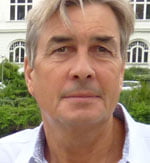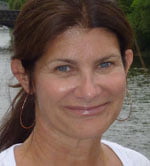Experiments in the drama lab
Writers and producers from across Europe gathered in Berlin this week for the European TV Drama Series Lab, organised by the Erich Pommer Institut and MediaXchange. Michael Pickard reports.

Andy Harries
The first European TV Drama Series Lab brought together experts from both sides of the Atlantic to offer information and advice about breaking into the US drama market and how European drama can learn from US series.
Among those present in Berlin this week (the first instalment of the two-part event was held in April) were X Files writer and producer Frank Spotnitz, who is behind Hunted, a new BBC/HBO spy thriller produced by UK prodco Kudos Film and Television.
He was joined by Simon Mirren, a former exec producer on US series Criminal Minds, who currently has a development deal with Sony Pictures Television; and James Kramer, a consultant for FremantleMedia on scripted adaptations in Russia and Ukraine.
Also present was Andy Harries, chief executive of UK indie Left Bank Pictures (Strike Back, Wallander); Maura Dunbar, exec VP and chief content officer at Odyssey Networks in the US; and former president of NBC primetime entertainment Angela Bromstad.
The line-up was completed by Jesse Cleverly, MD and creative director of transmedia prodco Connective Media, with ZDF Enterprises executive director Peter Nadermann and Tandem Communications VP Moritz Polter due to join the group later in the week.
Sessions, held at the Abion Spreebogen Waterside Hotel, tackled subjects ranging from pitches to production, with many participants getting their first taste of a US-style writers’ room. But while this way of writing a television drama may take some time to find favour among European broadcasters and producers, what was clear is that the US remains a key market for productions in both creative and commercial terms.
Other seminars included a discussion on the US/European coproduction models employed by Left Bank’s Strike Back, which airs on Sky1 in the UK and Cinemax in the US.

Angela Bromstad
The recent success of History miniseries Hatfields & McCoys, which twice broke cable viewing records, provided inspiration for those who felt US broadcasters had turned their backs on telemovies and limited-episode dramas.
Dunbar pointed to a shift in the pilot process, particularly through cable channel Hallmark, which is shooting two telemovies as backdoor pilots. The dearth of single dramas and miniseries, however, has its roots in the exorbitant cost of promoting those forms in comparision to a 10-, 13- or 22-part series, she said. Long-running dramas also have the ability to attract a greater amount of advertising revenue.
“What’s happening in the miniseries market is that networks cannot afford to do them straightaway. They’re looking to incubate them with partners in Europe and pre-sell to the US,” Dunbar said.
One producer predicted that it was inevitable other niche factual-skewing channels like History would now move into drama, perhaps offering non-US producers more opportunities to break into that market.
Meanwhile, other attendees were torn between producing content for their domestic markets and seeking to exploit it oversees. This latter option predominantly means filming in English to ensure maximum impact on the international scene, a tactic that will be used for Le Grande, a French police drama produced by Atlantique Productions for TF1 and distributed by SevenOne International.
“Germany wants programming in German or it’s not willing to put in money and will play the acquisition game,” said another producer. “But if it is in German, you cannot sell it [internationally].”
There was also debate about the potential to sell format rights into the US versus collaborating with a stateside partner, though the latter option may see a European producer lose control of their project to the US studio in order to strike a deal. One suggested compromise fell in the middle: complete your funding but stay in charge of your project by securing a US pre-sale.

Homeland
Overall, the message was a positive one. Bromstad said: “If you have an idea and you’re passionate about it, in this world market there will be a buyer for it. That’s the beauty of the proliferation of all these channels and the Hulus and Netflixes.”
Harries added: “Europe has a much more eccentric, passionate tradition of producing drama. It’s not about the money, it’s about the writer’s vision. If you take that to the US, they take it very seriously. They’re genuinely interested.
“Five or 10 years ago you would never have seen Homeland or The Killing [based on Israeli and Danish series, respectively] remade. This is US networks saying ‘We’ll have a bit of that.’ The market is much more open to us now.”
Producers and writers leaving the European TV Drama Series Lab will take away a sense that the US market is now more open to the international community than ever before.
However, the methods used and decisions taken to secure a US deal – whether by pre-sale, coproduction or a format deal – will continue to provide executives with plenty of real-life drama.














.jpg)




























